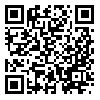Volume 24, Issue 2 (July 2017)
J Birjand Univ Med Sci. 2017, 24(2): 126-135 |
Back to browse issues page
Download citation:
BibTeX | RIS | EndNote | Medlars | ProCite | Reference Manager | RefWorks
Send citation to:



BibTeX | RIS | EndNote | Medlars | ProCite | Reference Manager | RefWorks
Send citation to:
Madanifard M, Namaei M M. Comparison of alexithymia scale and stress coping strategies in addicts under methadone treatment and those without treatment programs. J Birjand Univ Med Sci. 2017; 24 (2) :126-135
URL: http://journal.bums.ac.ir/article-1-2264-en.html
URL: http://journal.bums.ac.ir/article-1-2264-en.html
1- Department of Psychology, Ferdowsi University of Mashhad, Mashhad, Iran. , psy.madani@yahoo.com
2- Department of Health Education, Iran University of Medical Sciences, Iran.
2- Department of Health Education, Iran University of Medical Sciences, Iran.
Abstract: (10964 Views)
Background and Aim: Emotional deficiency and applying various methods against alexithymia due to addiction, have rarely been studied. The present study aimed at comparing the indices of emotional deficiency and applying various methods against alexithymia in addicts under methadone treatment and those lacking such a treatment.
Materials and Methods: The current study was a causal-comparative (ex post facto) one using alexithymia and coping with stress scales. Patients under methadone (n=55) treatment and addicts without treatment programs (n=55) were selected through available sampling. Data analysis was performed using independent t-test and descriptive indicators at the significant level of P≤0.05.
Results: Mean scores of emotional deficiency in the addicts lacking a treatment programme and those under treatment with methadone was 127.80±5.2 and 98.1±3.9, respectively. Independent t-test showed that the mean difference in the overall scale and in the subscales of emotional deficiency and comparative variables was significant (P <0.001).
Conclusion: It was found that patients under treatment with methadone have a better condition regarding their emotional feeling and apply more appropriate approaches against alexithymia.
Materials and Methods: The current study was a causal-comparative (ex post facto) one using alexithymia and coping with stress scales. Patients under methadone (n=55) treatment and addicts without treatment programs (n=55) were selected through available sampling. Data analysis was performed using independent t-test and descriptive indicators at the significant level of P≤0.05.
Results: Mean scores of emotional deficiency in the addicts lacking a treatment programme and those under treatment with methadone was 127.80±5.2 and 98.1±3.9, respectively. Independent t-test showed that the mean difference in the overall scale and in the subscales of emotional deficiency and comparative variables was significant (P <0.001).
Conclusion: It was found that patients under treatment with methadone have a better condition regarding their emotional feeling and apply more appropriate approaches against alexithymia.
Type of Study: Original Article |
Subject:
Clinical Psychology
Received: 2017/04/4 | Accepted: 2017/08/15 | ePublished: 2017/09/21
Received: 2017/04/4 | Accepted: 2017/08/15 | ePublished: 2017/09/21
Send email to the article author
| Rights and permissions | |
 |
This work is licensed under a Creative Commons Attribution-NonCommercial 4.0 International License. |




